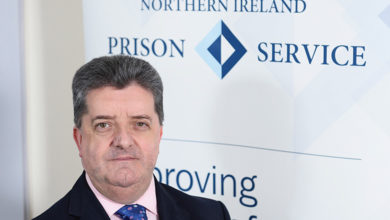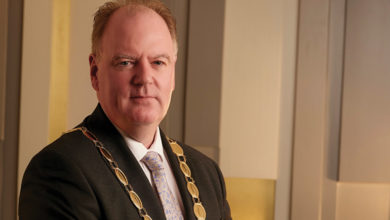Clearing up the bills
 Financial pain is on the way for the devolved justice system, if Northern Ireland does not get a grip on its legal aid bill, Dominic Grieve warned on the general election trail. The Conservatives also planned to solve the vexed bill of rights dispute by giving Northern Ireland a place in a national version.
Financial pain is on the way for the devolved justice system, if Northern Ireland does not get a grip on its legal aid bill, Dominic Grieve warned on the general election trail. The Conservatives also planned to solve the vexed bill of rights dispute by giving Northern Ireland a place in a national version.
Grieve spoke to agendaNi as Shadow Justice Secretary on the election campaign trail. Ken Clarke was appointed to the post in Cameron’s new cabinet with Grieve becoming Attorney- General, the Government’s chief legal advisor. MP for Beaconsfield and a barrister by background, he shadowed Labour’s Attorneys-General from 2003 to last September and also held the Home Office brief from June 2008 to January 2009.
With the devolution of policing and justice, he was keen to keep up links between the judiciary in Northern Ireland and England and Wales. Policy ideas could also be shared, including answering the looming question of how to fund legal aid – now costing £90 million locally and £2.1 billion in the other jurisdiction. David Ford has insisted he will press ahead with plans to cut legal aid fees.
The Justice Secretary brief covers the UK’s constitutional affairs, taking in the overall state of devolution, freedom of information and the whole area of human rights. Pressed on whether more powers should come to Stormont, after the justice transfer, Grieve said the Tories had no plans for a “sudden change” but would be prepared to listen to those calls.
“I think that’s an issue really firstly for the Northern Ireland Assembly and Executive to sort out over time,” he commented.
“We are committed as a party to making devolution in Northern Ireland work, just indeed as we’re committed to making devolution in Scotland or Wales work. We’re a constitutional party and we also recognise that devolution isn’t necessarily written in tablets of stone. It can be adjusted according to the passage of time and what is wanted over here.”
His personal interest in the province started in the 1980s when he twice came to stay with Daily Telegraph journalist Tom Utley, who had a summer house in Strangford. Utley was keen to explain Northern Ireland’s problems to his readers and emphasised the importance of helping to solve them.
“That whetted my appetitive” and the interest continued after his election to the Commons in 1997. Grieve was appointed as a constitutional affairs spokesman in 1999 and started to visit the province to learn about the peace process.
Rights
While Labour brought in the Human Rights Act in 1998, the Conservatives have blamed it for a “culture of grievance” where more litigation benefits lawyers. Its supporters, including many Liberal Democrats, say it protects the public from abuses of government power.
The Tories have instead suggested a UK bill of rights, which although sounding similar would be an improvement, in their view. This would be compatible with the 1950 European Convention on Human Rights but have the flexibility to protect specific British traditions.
Trial by jury, for example, evolved in England and the bill could also balance the media’s freedom of expression with privacy. He foresaw Parliament defining rights better and giving a steer for the judiciary.
On a higher level, it could also incorporate some “basic constitutional building blocks” such as the 1689 English Bill of Rights, which created a constitutional monarchy, and holding parliamentary elections every five years. The latter point has already been agreed by the coalition partners.
“Without creating a written constitution,” he stated, “you could be creating a document which seems to actually set out a framework of what national values are in terms of the legal framework we operate under.”
Grieve suggested that Northern Ireland could have its own section within the UK bill of rights, to reflect what the Belfast Agreement wanted. The Agreement raised the possibility of a specific Northern Ireland bill of rights, because of its own troubled history, but progress has stalled. Nationalists are in favour and unionists generally opposed.
Broken system?
Tories often claim that the criminal justice system in England and Wales was “broken” under Labour. Grieve recognises that Northern Ireland justice has been historically been different, given the “fight against terrorism” but this also meant that other problems went down the priority list.
He is “constantly reminded” that disorder, drug problems and anti-social behaviour have been “a very real feature for many communities in Northern Ireland which have sometimes, as a result of the terrorism problem, gone unaddressed.” Those will now be tackled at a devolved level.
Back across the water, he said the “broken” description comes from a “lack of confidence in the way the system operates”. This was demonstrated, he claimed, by the police and local people having differing priorities, police not being available when they were needed, slow courts and prosecutions, and a very high re-offending rate for released prisoners.
The Tories’ alternative was a focus on crime reduction, cutting police paperwork and “reconnecting” police and the communities they served. Directly-elected police commissioners were proposed.
Grieve was especially keen to highlight a “rehabilitation revolution” where everyone who goes to prison would start a personalised training and education programme. This would continue after release and be provided by the private and voluntary sector, paid according to their success.
Turning to civil justice, he claimed that the legal aid system was “on its last legs” due to inadequate funding and added a warning for local law-makers.
“You are about 10 years behind in Northern Ireland in that context but you are about to confront exactly the same problems, although hopefully you will be able to avoid making the same mistakes that were made in England and Wales 10 years ago.”
Cuts
Cutting spending is high on the Tories’ priority list but they have earmarked health and overseas aid as two areas to protect. It was put to him that given justice’s importance, its budget (currently £10.1 billion) should also not be cut.
Responding, he said he had no doubt that savings could be made and wanted to look carefully at where to do that, if appointed to the role. Fundamental reforms were also needed, such as making the courts more cost-effective and keeping down the cost of custody while keeping up the number of prison places.
“These are challenging areas but I have to recognise that I have to be as pro-active as my other colleagues in trying to ensure that we keep to our budgets,” he said in conclusion. “And I don’t have any complaint or reason to be concerned if I haven’t been exempted specifically and put in a ring-fenced area because I am confident that my colleagues recognise the importance of the work the justice department does.”





